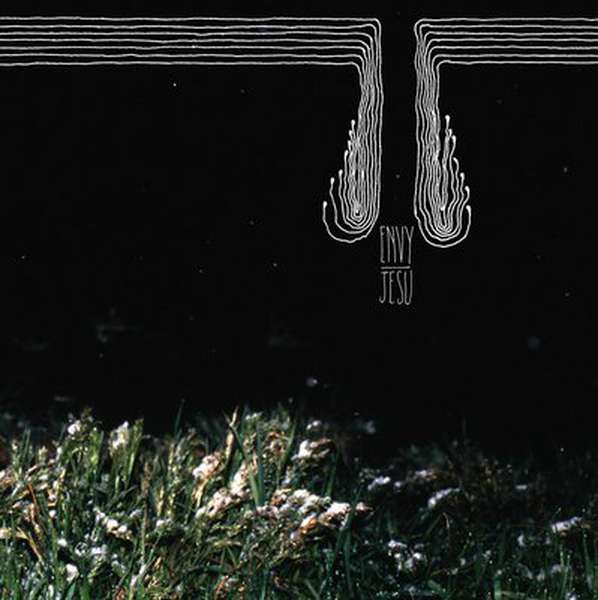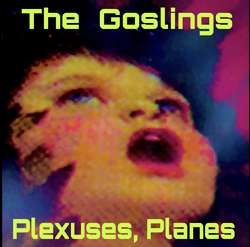Slipping under one's nose is not something an Envy or Jesu release tends to do, but somehow, this split between the two is not receiving the same amount of press as Envy's other split with Thursday. Thursday might be a "bigger" band, but considering the amount of press that Jesu usually gets on a release and the admiration that Envy receives (particularly of late as their popularity grows here in the states) it is inconceivable that such a pairing would skirt the notice of the indie and metal cognoscenti. Well, it did and that might be because this release is coming out on CD only in Japan via Daymare and on LP here in the US via Hydra Head. So if this release is a cannot miss in your mind and import fees frighten you, be ready to order the LP from Hydra Head when they put it up because if history teaches us anything, Jesu vinyl sells fast if it is limited (see the quickness of the sell out of the split with Eluvium as a reminder). So, with all this hyperbole and exposition aside the real question for this release is how are the songs on this release because both bands' previous records (Envy put out Abyssal earlier this year and Jesu put out Lifelinelast) seem like transition records in their own respective ways.
Right from the get go, the Envy portion of this split (three songs) immediately grabs the listener's attention, not because their songs are loud or it is a return to an older style which the band previously explored, but, instead, the songs are even more mellow than what Insomniac Doze or parts of Abyssal contain. Envy is definitely in experimentation mode on this split because there are much more electronics and ambient noise present as well as drum programming particularly in the song, "Conclusion of Existence" which sounds rather orchestral at times and adventurous with samples of explosions going off in the background while the vocals maintain a spoken word quality. "A Winter Quest for Fantasy" is more in line with the musical territory which the band explores on Insomniac Doze but with more "clean" vocals and much more subtle dynamic shifts that build to an obvious climax to the song (the whole track contains a very narrative quality like the story progression of a book); the keyboards from the first song on the split take more of a background role that fills the empty sound space with soft volume swells while the guitars carry much of the melody (which surprisingly is very evident in the track). The third and only other track from Envy on the split, "Life Caught in the Rain," contains a more up tempo arrangement in the music, and combining with the vocal part creates an almost "happy" timbre in the mood which the piece conveys; there is an indescribable effect or quality to the song that makes it noticeably different from the other two tracks from Envy on this release that is very welcome as it provides an interesting contrast across their three pieces.
The two songs on this split by Jesu suggest that maybe Justin Broadrick is in a further transition period; then again, he has a track record (as well as a stated intention) of using EP's to experiment musically that stretches back to his days with Godflesh, and the songs here might be examples of his continuing that modus operandi. The vocals, electronic beat, and keyboard heavy sound of "Hard to Reach" recalls some of the sounds evident in parts of the two most recent Jesu offerings (Pale Sketches and Lifeline), but the major differences between this and many of the songs on those two releases is the length of the track and the less "pop" sensibilities that are contained in the piece. "The Stars That Hang Above You" also shares many of the similarities that "Hard to Reach" does, but this song contains a bit more of a morose timbre (not that it is depressing sounding); it would have been nice to hear Ted Parsons (sometime drummer of Jesu) go off towards the end of the song instead of the fast pace of the drum programming that is actually there because it might add a bit of rawness to the glossy sheen that covers both of these tracks.
This split both excites and confuses me. As a fan of both bands, there is a considerable amount of expectation and anticipation that follows their recordings. Upon first reaction, the Envy tracks are much more accessible and seem much more polished than that of the Jesu tracks (to the extent that the Envy part initially received quite a bit more spins than that of the Jesu offerings). The three enjoyable Envy songs (that take up over fifteen minutes) zip along unbeknownst to the listener unless one gives close attention to the tracks. The two Jesu tracks initially seem rather unremarkable, but through multiple listening sessions, one can easily find themselves repeatedly lost in their more than twenty minutes of hypnotic thrums, swirling sound, and simple vocals. Definitely, this split album is a worthwhile release that should serve to barely whet listener's appetites for the next releases from both of these groups.



